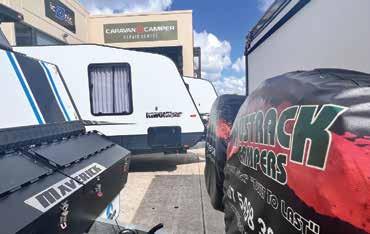
3 minute read
Camping....
Your Camp Site
• Use designated campsites or areas to reduce the risk of damage to surrounding vegetation.
Advertisement
• Don’t tie ropes to trees or other vegetation.
• You can use generators in some camping areas, but conditions apply. Know the rules before plugging in.
• Keep campsites free of scraps and keep all food, bait, fish, fishing gear and rubbish in well-secured containers. Never tie rubbish bags in trees or on your tent.
• When water isn’t provided, bring enough for all your drinking, cooking and cleaning. Treat all water collected in the park.
• Help protect our parks by ensuring you don’t carry plant seeds, soil or pests in footwear, clothing, boats, vehicles and camping gear.
• Leave domestic animals at home when camping in national parks. Some State forests and recreation areas allow dogs in camping areas—check before you go.
• Be considerate of other campers and wildlife by minimising noise.
• Protect the waterways by considering how you use soaps and detergents.
• Use gritty sand and a scourer instead of detergent to clean dishes and scatter water so that it filters through the soil. On K’gari (Fraser Island) you must be dingo-safe and pour washing water into a hole and cover it.
• Never feed wildlife—animals can become reliant on handouts and lose their fear of people. If they are fed or become accustomed to hand-outs or scrounging around camps, animals can become aggressive, often bullying or biting people for food.
• Always supervise children around campfires, campsites and surrounding natural areas.
• Everyone, not just children, should wear shoes to avoid stepping on sharps or campfire embers.
• Use a fuel stove in preference to having a campfire, or when campfires are not permitted.

Campfires
• If having a campfire is important, check they are allowed in the park before you book. On the day, also check:
• fire bans and restrictions
• park alerts
• Bring clean firewood such as untreated, mill off-cuts— collecting firewood from the park is prohibited.
• Ensure you are campfire safe.
• Use fire rings where provided.
• Use a previous campfire site, rather than starting a new one.
• Put campfires out with water. Do not use sand—embers stay extremely hot for many hours under the sand.
Toileting
• If you’re bush camping and toilets aren’t provided, move well away from campsites, walking tracks and creeks, and use a trowel to bury waste at least 15cm deep (50cm for sand).
• Bag all personal hygiene products including disposable nappies and take them away for appropriate disposal in rubbish bins. Don’t forget to bring your own soap and sanitiser.
• Empty chemical toilets at approved dump points, not in our parks’ toilets.
• Empty chemical toilets at approved toilet waste disposal facilities.
• Never pour portable toilet waste into parks’ toilets—the toilets cannot cope with this waste or the chemicals.
Rubbish removal
• Always pack to minimise rubbish.
• Take your rubbish with you when you leave.
• Some parks may offer large industrial bins, sometimes in fenced enclosures. Close the lids, shut gates behind you and if a bin is full find another.
Camping and turtles
If you’re beach camping during the marine turtle nesting and hatching season (November to March) remember:
• Bright lights and noises disturb nesting and hatchling turtles. Disturbed females may return to sea without laying their eggs.
• Camp and boat lights should not be visible from nesting areas. Cook early, shield camp lights and use small torches to find your way around.
• Never shine lights on turtles leaving the water, moving up the beach or digging nesting chambers.
When it comes to touring, having the right cooking gear is essential to ensure that you can prepare delicious meals on the go. And when it comes to cooking over an open flame, a good quality camp oven should be at the top of your list. In fact, your camp ovens will likely be the most important pieces of cooking gear that you bring with you on your trip. They are incredibly versatile, allowing you to boil water, cook casseroles, bake bread, and even fry up your favourite foods.
To get the most out of your camp oven, it's worth investing in two different sizes: a small and a large one. This will give you greater flexibility when it comes to cooking different types of meals, whether you're feeding a group of hungry campers or just making a quick cuppa for yourself. When making your purchase, it's important to choose the best quality camp oven that you can afford, as they will last longer and provide better cooking results than cheaper, lower-quality options.

To ensure that you can cook with confidence, make sure that you also receive a trivet with each purchase. This small wire rack is designed to keep your food elevated off the bottom of the oven, preventing it from sticking and burning. And when selecting your camp oven, try to choose a style with a lip around the edge of the lid. This feature will help keep ash and coals out of your food when you lift the top off, ensuring that your meals are delicious and ashfree every time.
Next edition - Seasoning Your Camp Oven









